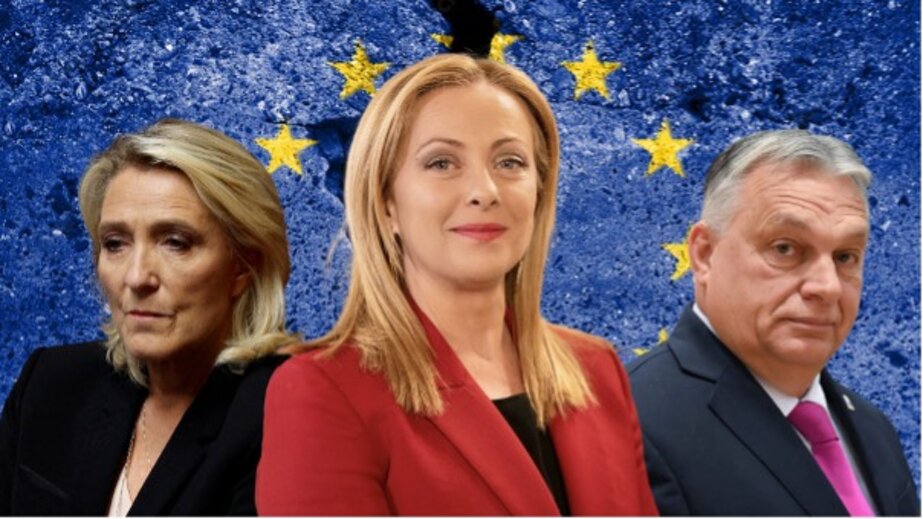L'ascesa della Destra: un Ritorno Europeo alle Vecchie Abitudini?
Di Alessandro Sbergamo

L’effetto pendolo
Una rappresentazione schematica dei seggi nel Parlamento Europeo mostra un blocco di destra importante, che include:
- PPE (Partito Popolare Europeo): 188 seggi
- ECR (Conservatori e Riformisti Europei): 78 seggi
- PfE (Patrioti per l’Europa, ID e alleati di estrema destra): 84 seggi
- ESN e NI (estrema destra): 58 seggi (25 + 33)
Totale seggi della destra: 408 su 705 (56,7%)
Senza il PPE, la destra e l'estrema destra contano 220 seggi, pari al 30,6%. Con il PPE, la destra forma il blocco più grande e influente, particolarmente efficace nell’instaurare alleanze con gruppi centristi come Renew Europe. Senza il PPE, la loro forza diminuirebbe, ma il loro impatto rimarrebbe significativo, specialmente nei dibattiti su migrazione, sovranità e cultura.
26 dicembre 2024
Tempo di lettura: 5 minuti
English version below
Il mondo occidentale sembra rimodellarsi dopo aver trascurato, quasi ripudiato, le preoccupazioni degli elettori di destra. Questa evoluzione, vista da alcuni come una salvezza e da altri come un pericolo, sta influenzando profondamente la politica e le società occidentale. Dagli Stati Uniti con Donald Trump alle destre europee, si trovano sempre più segnati dal pensiero conservatore. Per questo motivo, è fondamentale comprendere questa visione del mondo e il pubblico che la sostiene.
Immaginate un pendolo: più lo si sposta in una direzione, più oscillerà nella direzione opposta. Ora sostituite il pendolo con l’elettorato medio, e immaginate gli Stati Uniti e l’UE come il meccanismo che lo muove. Ciò che emerge è la nuova percezione di molti elettori conservatori: il pendolo è stato portato troppo verso sinistra, abbracciando temi come diritti trans e LGBTQI, multiculturalismo, progressismo e critiche al sistema capitalistico e patriarcale. Questo ha alimentato una reazione contraria, spingendo molte persone a opporsi a quella che i commentatori di destra definiscono ideologia “woke". Come studente universitario, ho spesso sentito persone, sia all'università che al di fuori, lamentarsi di un velo di censura o di una sensazione di emarginazione se non si abbracciano i nuovi ideali moderni. Vero o meno, ciò che conta è che molta gente si sente veramente giudicata.
La sinistra sembra aver alienato una vasta fetta della popolazione, spesso spaventata e insicura, al contempo i leader conservatori capitalizzano su questa divisione e malcontento della popolazione. Tuttavia, resta una domanda inquietante: quanto si spingerà a destra il pendolo?
Il panorama geopolitico
Non sorprende nessuno che l’Europa stia affrontando sfide senza precedenti. Questo clima di incertezza, storicamente, tende a favorire uno spostamento verso destra. Infatti, tradizionalmente, i partiti di sinistra incarnano innovazione e integrazione, mentre quelli di destra rappresentano stabilità e tradizione.
L’UE deve affrontare problemi legati all’aumento dei prezzi di gas, energia e beni alimentari, aggravati dalla guerra in Ucraina, che alimenta inflazione e tensioni politiche. Le politiche ambientali sono spesso ostacolate da elettorati conservatori, soprattutto nelle aree rurali. Inoltre, l’immigrazione resta un tema centrale per la destra, che cavalca l’onda e ripudiando le frontiere aperte. Per molti europei, la percezione del fenomeno migratorio rimane in gran parte negativa. Questi stessi temi, curiosamente, ricordano quelli che hanno portato alla vittoria del Tycoon, Donald J.Trump, negli Stati Uniti.
Politiche nazionali
A livello nazionale in Europa, la destra continua a guadagnare terreno. In Polonia, il partito Diritto e Giustizia (PiS) resta una forza dominante, nonostante qualche recente sconfitta. In Svezia, l’estremista Jimmie Åkesson ha trasformato i Democratici Svedesi, un tempo marginali, in un partito influente, capace di condizionare la coalizione di governo su temi come immigrazione e sicurezza nazionale.
In Francia, Marine Le Pen sta consolidando il proprio ruolo, esercitando un’influenza che va oltre la sua presenza istituzionale. In Germania, il partito AfD (Alternativa per la Germania) continua a crescere, soprattutto nelle regioni orientali. In Ungheria, Viktor Orbán rimane un simbolo dell’euroscetticismo e un alleato cruciale per altri leader di destra in Europa. Infine, Giorgia Meloni, leader dei Conservatori e Riformisti Europei, si è affermata come figura centrale del conservatorismo europeo, mantenendo al contempo un atteggiamento diplomatico capace di costruire alleanze anche all’interno delle istituzioni europee.
Le dinamiche del Parlamento Europeo
Osservazioni finali
Nonostante la crescita del conservatorismo, nessun blocco politico gode di un controllo assoluto. Tuttavia, le tendenze attuali sembrano favorire la destra, con figure come Donald Trump che rappresentano un punto di riferimento ideologico condiviso da molti leader europei.
Se la sinistra volesse riguadagnare terreno, dovrebbe riconsiderare il proprio approccio, evitando di apparire distante e aristocratica. Parlare direttamente ai bisogni e alle preoccupazioni quotidiane dei cittadini potrebbe essere una strategia vincente. Dopotutto, la retorica populista avvicina i politici alla "gente comune", una tattica si è rivelata particolarmente efficace. Ebbene si, la sinistra deve tornare a essere populista se vuole riconquistare molte delle persone che ultimamente sta perdendo.
Rise of the Right:
A European Return to the Old Ways?
By Alessandro Sbergamo
December 26th, 2024
Reading time: 5 minutes
The western world seems to be reshaping itself into an outgrowth of negligence of concerns of right-wing voters. This outgrowth, a savior for some and a monster to others, seems to be impacting the way politics and societies at large. From Donald Trump to various right wingers in Europe, the U.S. and the EU are being slowly shaped by right-wing conservative thoughts. Therefore, understanding this worldview and its audience is crucial.
The Pendulum Effect
Imagine a clock with the pendulum: the more you bring it further to one side, the more it will sway to the other side. Now substitute the clock with the U.S. and the EU, and the pendulum with the average person. Who swings the pendulum is a whole other question yet is not the focus of this article. In any case, in the mind of the average voter for conservative parties across the European and most definitely American political landscapes, the pendulum has been brought too much towards conventionally left-leaning discourse: LGBTQI and Trans rights, multiculturalism, integration, progressivism, and an ungodly hatred towards the existing patriarchal capitalist system. Therefore, more people are contrasting what has been coined by right wing commentators as “woke ideology”. As a Master’s student, for years I have heard people on campus as much as on the street claiming to feel censored by this ideology. In addition to a general lack of recognition – and really, empathy – to people on the right, it appears that the left has alienated a huge portion of scared people; instead, conservative leaders are capitalizing on this discontent and fear. Polarization aside, what truly could be a concerning reality, is how right the pendulum will swing.
Setting the Stage
By no means a surprise, the European continent is facing all kinds of challenges. This cauldron of issues breeds uncertainty, which historically speaking, is almost always a prelude to a shift towards the right. In fact, conventionally, left-leaning parties usually represent innovation and integration, while their counterpart symbolizes the tradition and stability.
The EU is dealing with price levels for gas and energy, together with that of food. The war in Ukraine is really stress-testing Europe, as inflation remains a concern if it further soars. Additionally, environmentalist green transitions are being roadblocked by conservative (and rural) constituencies. Persisting social inequality certainly does not help either. Geopolitically, the Ukrainian war is fueling Eurosceptics and those who are against support to Zelenskyy’s ongoing effort. Furthermore, migration is a warhorse of right-wing politics, generating mass discontent towards open borders. Real threat or not, what matters is the perception, which for many European is overwhelmingly negative. Interestingly enough, these salient issues are almost 1 for 1 identical to the American ones, which brought the unequivocal victory of Donal J. Trump.
National Politics
At national levels, conservative sentiments have been steadily gaining traction. In Poland, the Law and Justice Party (PiS) has had some recent losses, but overall remains a demanding political force. In Sweden, Jimmie Åkesson turned the Sweden Democrats, that was barely a point on a graph, into an influential party that is being consulted by the main governing coalition. Arguably this is a politically rare scenario, because the far-right Social Democrats are indeed not governing yet have struck a deal with those who are governing Sweden whereby on certain matters (immigration and national security, just for a change) they must be consulted.
Instead, in France and Germany, the political turmoil is impressive. French Marie Le Pen has slowly been gaining influence, and even if not in an executive place, has a gravity of her own and has to be accounted for anyone wanting to pass legislation. Similarly, the German extremist AfD is rising in polls, especially in eastern regions. Lastly, a member of the old guard of Euroscepticism, Hungarian leader Viktor Orbán continues to criticize Brussels. Moreover, his leadership in opposing EU rule-of-law measures and fostering alliances with other right-wing leaders makes him a pivotal figure. Lastly, arguably the single most influential European conservative, leader of the European Conservatives and Reformists, is il presidente Giorgia Meloni. Just her insistence on using male pronouns for her role as Italian Prime Minister projects an image of classical iron lady, Thatcher-like stances. Although, even if she spearheads European conservatism, she is probably the most diplomatic out of the conservative bunch, demonstrated by her coalition-building skills within the EU institutions.
Concerning the European Parliament, here is a schematic representation of their votes (from the official European Parliament website):
- EPP: 188 seats
- ECR: 78 seats
- PfE (far-right ID and allies): 84 seats
- ESN & NI (far-right): 25 + 33 = 58 seats
Total Right-Aligned Seats: 188+78+84+58= 408 (56.7%)
Without moderate EPP: 220 (30.6%)
With the EPP, the right turns into the largest ideological bloc in the Parliament, with particular influence when forming alliances with centrist groups like Renew Europe.
Without the EPP, the hard right and far-right groups still might represent an influent force, but would be a minority (i.e., significant minority). One can also argue that their lack of seats might be compensated by their ability to influent debating skills particularly on migration, sovereignty, and cultural issues.
Final Remarks
Notwithstanding the gradual increase of vote shares by the conservatives, they still do not operate on completely absolute grounds; that is to say, the right nor the left always have the majority. Albeit, the trend seems more favorable for the right so far, also considering the fact that Trump’s politics might spearhead his worldviews, that align with many of the European political leaders.
If the left cross-culturally wants to regain the trust of their lost votes, perhaps they might need to reconsider their approach. Lately, it is very common for people to divide themselves into pro-establishment and anti-establishment, with the latter being led by right-wingers. Especially for EU institutions, a good strategy could be talking directly to the issues (and wallets) of the Europeans, appearing less like high-end aristocrats. Right or left, all politicians should present themselves are policymakers that work for the people, not the other way around. Even if ultimately, it is more of the same, conservatives understand this mechanism and often deploy populist rhetoric to appear closer to the average person.
Alessandro Sbergamo
Alessandro è dotato di una solida base in relazioni internazionali, grazie al conseguimento della laurea triennale in “PPE” (Politics: Philosophy and Economics) presso l'Università LUISS e al Master in International Relations che sta attualmente svolgendo presso lo University College Dublin. Il suo percorso accademico, arricchito dalla ricerca extracurriculare che lo accompagna quotidianamente, riflette un profondo interesse per le complessità delle relazioni geopolitiche e di politica estera. Questa passione alimenta il suo rigore nel potenziare sempre di più le sue conoscenze e skill in questa area di studio.

